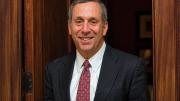Every day, my presidency is infused with Harvard history. I work in Massachusetts Hall, a sturdy brick building where John Adams rested his head and George Washington quartered his troops. I live in Elmwood, a stately home built by a loyalist to King George III that later became a military hospital during the Revolutionary War and, later still, housed Elbridge Gerry, who served as governor of Massachusetts and vice president of the United States. My comings and goings on most days happen in spaces that remind me of the role the University has played not only in bringing our country into being but also in supporting and sustaining it. Harvard was nearly 140 years old the day the Declaration of Independence was signed—with Adams, Gerry, and six other Harvard alumni among the signatories—and we are nowhere near done helping to perfect the Republic.
As we move deeper into what is likely to be an especially contentious election year, I find myself grateful for the many ways in which Harvard continues to define and defend democracy. The most basic of our efforts is the most fundamental: helping to register voters and encouraging them to vote. TurboVote, an online tool developed by two alumni of the Harvard Kennedy School, makes the process far less onerous than it’s been in the past, and I send students to that resource as often as I can with a reminder that voting is the first responsibility of citizenship. I have yet to meet anyone—liberal or conservative, Democrat or Republican, or anyone in between—who thinks the world is perfect. All of us who enjoy the franchise have a responsibility to exercise it.
To vote intelligently depends, of course, on the availability of useful information and increasingly on the ability to discern signal from noise in an extraordinarily cacophonous media landscape. The Shorenstein Center on Media, Politics and Public Policy is a leader in exploring the spread of distortions, misrepresentations, and deceptions online. Launched earlier this year, the Harvard Kennedy School Misinformation Review relies on expedited peer review to disseminate research with real-world consequences. At the same time, the Center makes scholarship on complex topics more readily accessible to newsrooms through the Journalist’s Resource. Some 53,000 followers on Twitter and more than 50,000 subscribers to its weekly newsletter demonstrate the wide reach of the effort, which recently covered subjects as varied as carbon pricing, gun buybacks, and paid family leave.
Our teaching and scholarship are complemented by members of our community who have responded to the call to serve the public. Harvard is proud to count among its alumni many men and women who have served this country in uniform, including more recipients of the Congressional Medal of Honor than any other school outside of the nation’s service academies. In my travels as president, I have met dedicated alumni spanning the political spectrum who are improving cities and states across the country through their good work, both as elected officials and as staff and volunteers. Fifty-five current members of Congress are alumni, and my advocacy in the Capitol on behalf of higher education has been helped considerably by their experience, insight, and partnership. It is inspiring to learn about their commitment both to their fellow citizens and to their alma mater, and to hear firsthand how they work to ensure that our democracy thrives.
Much is rightly expected of those to whom much has accrued. When I welcomed the Harvard College Class of 2023 to our campus, I told them that Harvard, Massachusetts, and the nation are far from perfect, and I challenged them to stand up and speak out for the causes in which they believe. For every effort I have mentioned in this brief piece, there are at least a dozen more happening across our campus that explore democracy from every angle, revealing to us both its complexity and its consequence. Like our predecessors, we embrace the special responsibility of shaping our nation as it shapes us, eager to preserve a form of government that has enabled the pursuit of happiness for centuries.









